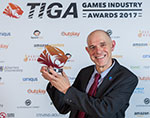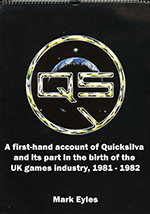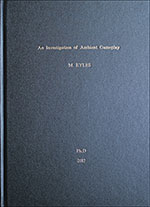

In November 2017 Mark received the TIGA Person of the Year Award at the TIGA Awards ceremony held at the Victoria and Albert Museum in London. The award recognized his contributions to the games industry, teaching of game development and his work for TIGA.

Read about how Mark started out in the games industry and how the UK games industry first started in the early 1980s in this article in the Cogent Arts & Humanities Journal (Volume 3, 2016 - Issue 1):

A first-hand account of Quicksilva and its part in the birth of the UK games industry, 1981–1982
In September 2012 he submitted the thesis of his part time PhD started in 2004, finally completing in January 2013. The thesis is titled "An investigation of ambient gameplay" and can be downloaded here:

An investigation of ambient gameplay .pdf (6MB)
Here is the abstract, which briefly describes the research:
"Inspired by Brian Eno's ambient music, which is persistent and supports different levels of engagement, this research explores ambient gameplay in computer, video and pervasive games. Through the creation of original games containing ambient gameplay and looking for ambient gameplay in existing commercial games, this research focuses on gameplay that supports a range of depths of player engagement. This research is not concerned with ambient intelligent environments or other technologies that might support ambience, but focusses on gameplay mechanisms.
The definition of ambient music is used as a starting point for developing a tentative set of properties that enable ambient gameplay. A game design research methodology is initially used. Two very different research games, Ambient Quest (using pedometers) and Pirate Moods (using RFID, radio-frequency identification, technology) are analysed. The resulting qualitative ambient gameplay schema contains themes of persistence, discovery, engagement, invention, ambiguity and complexity. In order to confirm the wider applicability of this result a case study of an existing commercial game, Civilization IV, is undertaken. Ambient gameplay properties of engagement, complexity, abstraction, persistence and modelessness identified in Civilization IV, and other commercial games, are combined with the ambient gameplay schema to develop a definition of ambient gameplay. This definition is the basis for a set of investigative lenses (lenses of persistence, attention, locative simultaneity, modelessness, automation and abstraction) for identifying ambient gameplay.
This research creates a deeper understanding of computer games and hence gives game designers new ways of developing richer gameplay and gives games researchers new ways of viewing and investigating games."
The research games Ambient Quest: Pedometer was first played at the 2007 Women in Games conference and can be downloaded here: Ambient Quest. There are also details of the Ambient Quest: Pirate Moods RFID game here.
Before entering academia Mark spent 22 years working in the games industry, from 1981 to 2003, including:
Head of Design at Rebellion
Creative Director at Hollis Research Limited
Freelance Design Consultant to Electronic Arts, Sega, Microprose, Hasbro, Activision, SCI, Virtuality
Creative Partner at Focus Creative Enterprises
Director at Holografix Limited
Director at Quicksilva Limited
During this time he also wrote scripts for 2000 AD and Sonic the Comic and, for a couple of years, made holograms.
Before joining the games industry Mark worked as a mathematics teacher at Glen Eyre School, Southampton.
Mark lives in Southampton with his wife Caroline. His two boys, Joe and Tom, are currently engaged in PhD research (Joe: Mathematics and Tom: Biology).
Current contact email address: mark@eyles.co.uk
Note that these contact details are no longer in use:
Animation Games & Enterprise Section Lead
Principal Lecturer/Advanced Games Research Group
School of Creative Technologies
University of Portsmouth
Eldon Building
Winston Churchill Avenue
Portsmouth PO1 2DJ
United Kingdom
Telephone: (44) 23 9284 5468
Email: mark.eyles@port.ac.uk
Website: www.port.ac.uk/games